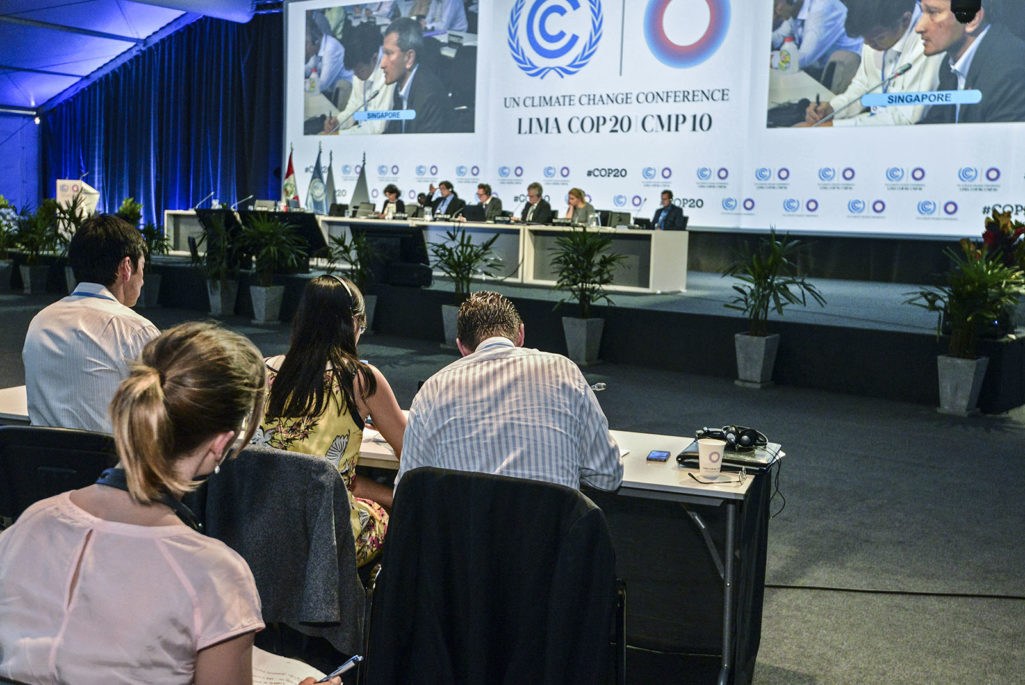Action Needed to Attain Global Climate Goals

Members of representative commissions of the countries participating in the climate change conferences, during last year’s COP20 in Lima, as they continue working on a final document draft.
Photo: Cris Bouroncle/AFP/Getty Images
The 2015 World Energy Trilemma report is focused on getting the energy sector to articulate their views on what is needed from the forthcoming negotiations in Paris on climate change, COP21, to enable them to continue to make progress on balancing the trilemma goals effectively across all the regions of the world. The report distils the views of a wide range of energy policymakers, investors in the energy sector, and energy business leaders. A key finding is the call from energy business leaders in particular or the energy sector to be more involved in the climate change negotiations—and for these to move away from the ‘theology’ of the commitments required from individual countries and towards a pragmatic approach with more focus on delivery of actions that can be measured and monitored.
The first reason prompting the call for engagement—to ensure that negotiators do not inadvertently destroy value in the sector—may seem to some outside the energy sector as somewhat self-serving. But in fact it is not so much about the vested interests of business as about the need for huge investment to manage the energy transition that is fundamental to tackling climate change. Unless we ensure that that investment can flow to the energy sector, the 2 degree Celsius target espoused by the parties to the negotiations, as long ago as COP15 in Copenhagen in 2009, will be impossible to meet. Decisions on the nature, scale and speed of the energy transition must recognize the realities of energy supply and demand which are changing faster than ever before, how to accommodate the accelerating deployment of clean technologies and what will be needed by way of change to existing business models. A close partnership and dialogue between the public and private sectors will be key.
In specific terms, the World Energy Council’s community calls for a stable and clear policy framework, with a single measurable target, while stressing that the Paris agreement must be flexible in recognizing the differing circumstances and vulnerabilities of individual countries. This recognizes that the agreement will not be a single top down one, but will be based on an aggregation of individual country commitments. The energy sector says the agreed framework must allow for systematic monitoring, for adjustment of individual country targets as their circumstances develop, and, to ensure longevity, an internal feedback loop.
Five enablers have been identified that are key to the successful transition to a low-carbon energy system.
First, barriers to technology transfer—such as tariffs on environmental goods and services, or lack of protection for intellectual property rights—need to be addressed. If they can, energy businesses will take a lead, but not the sole role in scaling up technology transfer to the degree required.
Secondly, a global carbon price could help deal with concerns over competitiveness (or so called ‘carbon leakage’), and would be more economically efficient than localized pricing. This means we need to ensure that there is the potential for the many regional and national trading schemes operating or under development to be linked. But, most importantly, a price reflecting the true costs of high-carbon activities is seen as needed to help avoid distortion of investment decisions between high- and low-carbon projects.
The third enabler is giving the right policy signals to encourage financing to flow. As we learnt from the financial sector in our report last year, energy businesses must build a pipeline of bankable projects to take advantage of the finance that is available.
Fourthly—and some might find this surprising—energy business leaders call for there to be more emphasis on managing demand as well as supply.
Finally, strongly echoing the call from energy business leaders in our 2012 World Energy Trilemma report is the requirement for a step change in investment, and in collaboration between the public and private sectors, in research, development and demonstration (RD&D).
Perhaps more important than any of these individual messages is the strong emphasis emerging from the workshops and individual conversations for the development of an integrated voice and common language on how to describe the challenges of tackling climate change and the best ways in which the energy sector can respond to them. As we heard, social acceptance is the greatest challenge in managing the energy transition and we must work together—energy business leaders, policymakers, and the investor community—to inform public understanding of the nature of the challenges and the true implications of various approaches to solving them. Only in that way will we gain popular support for the hard decisions we face.
What this report shows is that the energy community believes the time is ripe for stronger action on climate change, and that it is perfectly feasible to move to another level in doing so. Indeed, without progress from the negotiations which move us on from commitments to vigorous implementation of them, it will become increasingly difficult to deliver across the three trilemma goals of energy security, energy equity and environmental sustainability. The energy industry is more than ready to play its full part, building on the many examples of leadership which some businesses are already showing. As they told us, it is now time to get something done.





